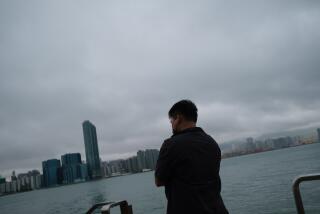Rethinking Hong Kong
- Share via
Nowhere have recent events in China been watched more closely or with greater apprehension than in the British colony of Hong Kong, most of whose land area is scheduled to revert to China’s control in 1997. Under an agreement negotiated with Britain five years ago, China pledged that Hong Kong’s 5.7 million people would retain the social and commercial freedoms they now enjoy for at least another 50 years. In other words, they could keep their bustling free market economy and not be subject to totalitarian political and intellectual controls. That at least was the promise. A lot of Hong Kongers no longer believe it.
As a result, more and more of them are thinking about emigration. Last year 46,000 took their skills and their capital to other countries. This year, and particularly since China’s bloody crackdown on dissenters, visa applications for the United States, Australia, Canada, Jamaica and other countries have soared. But it is to Britain that most potential emigrants look.
More than 3.2 million Chinese who were born in Hong Kong are eligible for “dependent territory” British passports. But these are essentially travel documents, not evidence of British citizenship. Sir David Wilson, the colony’s governor, is one of those who argues that native-born Hong Kongers should have the right to live in Britain in the event of an “Armageddon scenario,” i.e., if it develops that Hong Kong’s new masters are ready to be as brutal to its residents in the late 1990s as they are to their own people now. That possibility can’t be dismissed as an idle fear.
So far, though, Prime Minister Margaret Thatcher’s government refuses to consider inviting eligible Hong Kongers to settle in Britain. As Foreign Secretary Sir Geoffrey Howe remarked the other day, if all native-born Hong Kongers were to emigrate to Britain, the country’s ethnic minority would double. The government’s deep and obvious concern is that the social tensions already troubling Britain would be dangerously and dramatically exacerbated should that happen.
But against this understandable worry must be set the no less pressing claims of those Hong Kong Chinese who genuinely fear that an Armageddon scenario is in fact all too plausible. There is of course no predicting who will be running China eight years from now or what kind of regime they will be presiding over. That is just the point. Solemn promises or not, Hong Kong’s future for now is shadowed by uncertainties.
Britain has an obvious political problem as it contemplates accepting mass immigration from Hong Kong. But where the welfare and safety of more than 3.2 million people are involved, it also has a grave moral responsibility that can’t simply be ignored or wished away.
More to Read
Sign up for Essential California
The most important California stories and recommendations in your inbox every morning.
You may occasionally receive promotional content from the Los Angeles Times.













